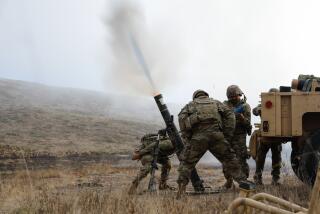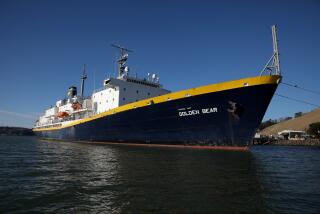Rep. Lowery Says Probe Exonerates Two Navy Officers
SAN DIEGO — A Navy investigation at Miramar Naval Air Station has exonerated the base’s commander and a rear admiral of any wrongdoing in a scandal involving exorbitantly priced aircraft ashtrays, Rep. Bill Lowery (R-San Diego) said Friday.
Lowery disclosed that while the Navy’s final report on the matter is still under review by Navy officials, it praises rather than implicates Miramar’s commander, Capt. Gary E. Hakanson, and Rear Adm. Thomas J. Cassidy Jr., head of the Pacific Fleet’s Fighter Airborne Early Warning Wing.
Relieved of Duty
Cassidy, Hakanson and the base’s supply officer, Cmdr. Jerry L. Fronabarger, were relieved of duty May 30 by Defense Secretary Caspar W. Weinberger and Navy Secretary John Lehman.
Defense Department and Navy officials declined to comment on the report, which may be made public next week.
The decision came after Rep. Jim Bates (D-San Diego) revealed that Miramar had paid Grumman Corp. about $630 each for two E-2C aircraft ashtrays, $800 for two wrench sockets and $2,410 for a ground lock, which holds an F-14 Tomcat’s horizontal stabilizer in place during maintenance.
Bates, whose information came primarily from Miramar purchasing agents, scoffed at word that the Navy’s report had been completed.
“They’ve already allegedly finished their investigation and they never even talked to me,” Bates complained. “I’ve got a box full of documents that they never considered. I’m beginning to think this may be a cover-up.”
Bates on Friday sent a letter to the officer who prepared the report, Rear Adm. John Batzler, expressing concern that “you may have completed this investigation without access to all the facts. . . . This concern is particularly relevant in considering that several of my sources are highly reluctant to discuss internal Miramar operations and problems with U.S. Navy investigators, since they consider possible reprisals that they might be subjected to.”
Behavior Questioned
Not immediately clear was whether Navy investigators found evidence to substantiate Fronabarger’s firing. But some sources have indicated that Fronabarger may have “acted inappropriately” when told by workers of exorbitantly priced purchases and, unlike Cassidy and Hakanson, may not be exonerated, according to a Lowery aide, Dan Greenblat.
Greenblat said that Lowery had not seen the Navy’s report but was notified of many of its findings by sources whom Greenblat would not identify.
“The evidence available to the Navy supports reinstatement of (Cassidy and Hakanson),” Lowery said in a press release issued Friday. “From what I have seen, Cassidy and Hakanson were not at fault for . . . procurement abuses. Instead, they conducted themselves with high professionalism and took appropriate action when procurement irregularities were discovered.”
Lehman has said that he would consider reinstating the men if the Navy’s investigation turned up no evidence of wrongdoing. Lehman, himself a reserve naval aviator, was in Norfolk, Va., Friday on active duty and could not be reached for comment.
Involvement Denied
Cassidy, Hakanson and Fronabarger have denied any involvement in the procurement scandal. Both Cassidy and Hakanson have insisted that they were not stationed at the base when the ashtray transactions occurred; Fronabarger has maintained that while he was present at the time of some of the purchases, he had no direct knowledge of them.
Meanwhile, a Navy spokesman on Friday provided figures that he said refuted suspicions that the Navy in 1983 paid Grumman $696,496 for 16 Tomcat electronic modification kits that were supposed to cost $67,280.
In April, 1983, the Navy contracted with Grumman to pay $4,205 each for modification kits designed to improve the fire control system of Tomcat fighters. The Times last week reported that in July, 1983, Grumman sent the Navy an invoice charging $43,531 each for 16 kits--a total cost of $696,496--according to documents.
Confusion Over Amount
When pressed last week, Navy officials said they were not sure how much was actually paid for the kits.
Lt. Peter Johnstone, a Navy spokesman in Washington, conceded Friday that the Navy did receive a separate bill from Grumman for $43,531 relating to the kits, but that the charge was for a “one-time, non-recurring cost for engineering, design, development and validation.”
Johnstone said the Navy purchased 76 of the modification kits for $4,205 each, “which is considered fair and reasonable. . . .” Johnstone said that Grumman did send the Navy an invoice form that mistakenly included the $696,496 figure, but the amount was never paid.
More to Read
Sign up for Essential California
The most important California stories and recommendations in your inbox every morning.
You may occasionally receive promotional content from the Los Angeles Times.









